Related Research Articles
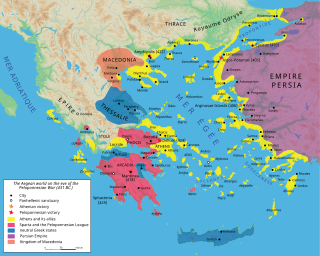
The Delian League, founded in 478 BC, was an association of Greek city-states, numbering between 150 and 330, under the leadership of Athens, whose purpose was to continue fighting the Persian Empire after the Greek victory in the Battle of Plataea at the end of the Second Persian invasion of Greece.

The Peloponnesian War was an ancient Greek war fought between Athens and Sparta and their respective allies for the hegemony of the Greek world. The war remained undecided for a long time, until the decisive intervention of the Persian Empire in support of Sparta. Led by Lysander, the Spartan fleet, built with Persian subsidies, finally defeated Athens and started a period of Spartan hegemony over Greece.

Pericles was a Greek politician and general during the Golden Age of Athens. He was prominent and influential in Athenian politics, particularly between the Greco-Persian Wars and the Peloponnesian War, and was acclaimed by Thucydides, a contemporary historian, as "the first citizen of Athens". Pericles turned the Delian League into an Athenian empire and led his countrymen during the first two years of the Peloponnesian War. The period during which he led Athens, roughly from 461 to 429 BC, is sometimes known as the "Age of Pericles", but the period thus denoted can include times as early as the Persian Wars or as late as the following century.

Alcibiades was a Athenian statesman and general. The last of the Alcmaeonidae, he played a major role in the second half of the Peloponnesian War as a strategic advisor, military commander, and politician, but subsequently fell from prominence.

Epaminondas was a Greek general of Thebes and statesman of the 4th century BC who transformed the Ancient Greek city-state, leading it out of Spartan subjugation into a pre-eminent position in Greek politics called the Theban Hegemony. In the process, he broke Spartan military power with his victory at Leuctra and liberated the Messenian helots, a group of Peloponnesian Greeks who had been enslaved under Spartan rule for some 230 years after being defeated in the Messenian War ending in 600 BC. Epaminondas reshaped the political map of Greece, fragmented old alliances, created new ones, and supervised the construction of entire cities. He was also militarily influential and invented and implemented several major battlefield tactics.
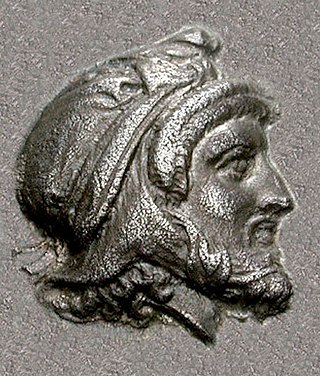
Pharnabazus II was a Persian soldier and statesman, and Satrap of Hellespontine Phrygia. He was the son of Pharnaces II of Phrygia and grandson of Pharnabazus I, and great-grandson of Artabazus I. He and his male ancestors, forming the Pharnacid dynasty, had governed the satrapy of Hellespontine Phrygia from its headquarters at Dascylium since 478 BC. He married Apama, daughter of Artaxerxes II of Persia, and their son Artabazus also became a satrap of Phrygia. According to some accounts, his granddaughter Barsine may have become Alexander the Great's concubine.
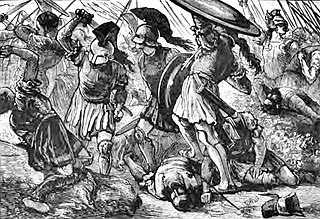
The Battle of Chaeronea was fought in 338 BC, near the city of Chaeronea in Boeotia, between Macedonia under Philip II and an alliance of city-states led by Athens and Thebes. The battle was the culmination of Philip's final campaigns in 339–338 BC and resulted in a decisive victory for the Macedonians and their allies.
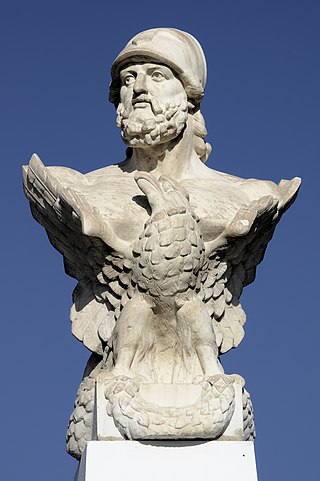
Cimon or Kimon was an Athenian strategos and politician.
Cleinias, father of Alcibiades, brother of Axiochus, and member of the Alcmaeonidae family, was an Athenian who married Deinomache, the daughter of Megacles, and became the father of the famous Alcibiades. Plutarch tells us that he traced his family line back to Eurysaces, the son of Telamonian Ajax. Cleinias died at the Battle of Coronea in 447 BC.

Eion, ancient Chrysopolis, was an ancient Greek Eretrian colony in Thracian Macedonia specifically in the region of Edonis. It sat at the mouth of the Strymon River which flows into the Aegean from the interior of Thrace. It is referred to in Thucydides' History of the Peloponnesian War as a place of considerable strategic importance to the Athenians during the Peloponnesian War.
The "Second Philippic" is an oration that was delivered by the Athenian statesman and orator Demosthenes between 344–343 BC. The speech constitutes the second of the four philippics the orator is said to have delivered.
Peace of Philocrates is the name given to the peace treaty concluded in 346 BC between Athens and Macedon under Philip II. Philocrates was the name of the main Athenian negotiator of the Treaty.
In Ancient Greece, phoros was the name for the membership dues paid to Athens by the members of the Delian League, formed to offer protection from Persian forces. It could be paid in military equipment or money, most usually the latter. Consequently, a great deal of funds was paid to Athens for the purpose of military initiatives. Athens increased its military forces, resulting in its becoming a dominant and wealthy power.

Classical Greece was a period of around 200 years in Ancient Greece, marked by much of the eastern Aegean and northern regions of Greek culture gaining increased autonomy from the Persian Empire; the peak flourishing of democratic Athens; the First and Second Peloponnesian Wars; the Spartan and then Theban hegemonies; and the expansion of Macedonia under Philip II. Much of the early defining politics, artistic thought, scientific thought, theatre, literature and philosophy of Western civilization derives from this period of Greek history, which had a powerful influence on the later Roman Empire. Part of the broader era of classical antiquity, the classical Greek era ended after Philip II's unification of most of the Greek world against the common enemy of the Persian Empire, which was conquered within 13 years during the wars of Alexander the Great, Philip's son.

The History of Sparta describes the history of the ancient Doric Greek city-state known as Sparta from its beginning in the legendary period to its incorporation into the Achaean League under the late Roman Republic, as Allied State, in 146 BC, a period of roughly 1000 years. Since the Dorians were not the first to settle the valley of the Eurotas River in the Peloponnesus of Greece, the preceding Mycenaean and Stone Age periods are described as well. Sparta went on to become a district of modern Greece. Brief mention is made of events in the post-classical periods.

The Altar of Athena Polias was a former structure on the Acropolis of Athens dedicated to the goddess Athena.

The Theban–Spartan War of 378–362 BC was a series of military conflicts fought between Sparta and Thebes for hegemony over Greece. Sparta had emerged victorious from the Peloponnesian War against Athens, and occupied an hegemonic position over Greece. However, the Spartans' violent interventionism upset their former allies, especially Thebes and Corinth. The resulting Corinthian War ended with a difficult Spartan victory, but the Boeotian League headed by Thebes was also disbanded.
The Chalcis Decree was an oath of loyalty that the people of the city of Chalcis on the island of Euboea were forced to swear after the failure of a revolt from the Athenian Empire in 446/5 BC. The decree is difficult to date but it followed the revolt of the cities of Euboea in 446. The islanders were angered by the increasingly harsh imperialism of Athens and attempted to take advantage of the defeat of Athens in the Battle of Coronea in neighbouring Boeotia which resulted in the loss of the Athenian “land empire”. The revolt was crushed by the Athenians led by Pericles. Other cities on Euboea, such as Eretria, had decrees with exactly the same provisions passed. The decree is considered a point at which there was no longer any doubt of the imperial power held by Athens over its allies in the Delian League.
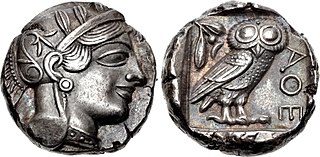
The Athenian coinage decree also known as the Standards decree was a decree made by the Athenians to standardise currency amongst the states with whom they were allied. Between the years of 450 and 447 BC, the use of Athenian silver currency and Athenian weights and measures was made obligatory in all allied states of the Athenian Empire.

Pausanias was the Agiad King of Sparta; the son of Pleistoanax. He ruled Sparta from 445 BC to 427 BC and again from 409 BC to 395 BC. He was the leader of the faction in Sparta that opposed the imperialist policy conducted by Lysander.
References
- ↑ Aspects of Greek history, 750-323 BC By Terry Buckley Page 289 ISBN 0-415-09958-7
- ↑ The Peloponnesian War: a military study By John Francis Lazenby Page 264 ISBN 0-415-32615-X
- From Cyrus to Alexander By Pierre Briant, Eisenbrauns Page 75 ISBN 1-57506-031-0
- The administration of the Ptólemaic possessions outside Egypt By Roger S. Bagnall Page 50 ISBN 90-04-04490-6
- Aspects of Greek history, 750-323 BC By Terry Buckley Page 289 ISBN 0-415-09958-7
- The Athenian empire By Russell Meiggs pages 113 212 214 ISBN 0-19-814843-7